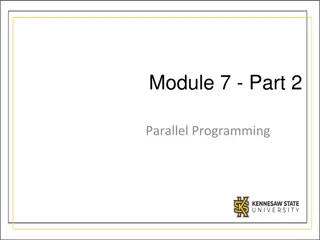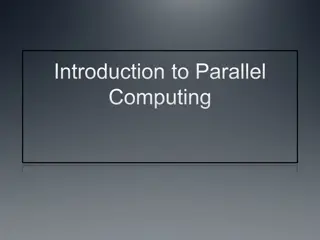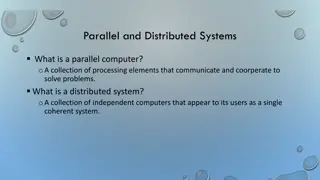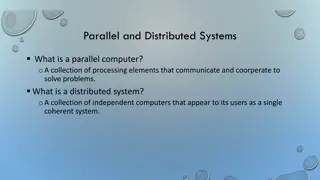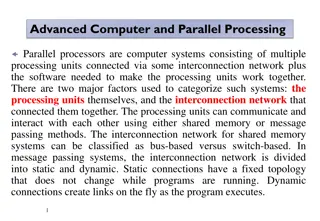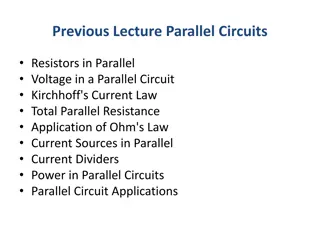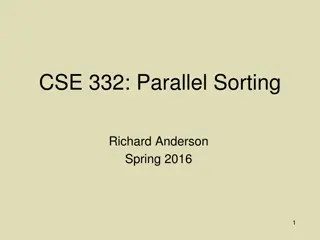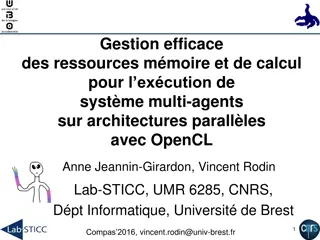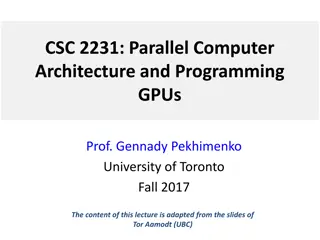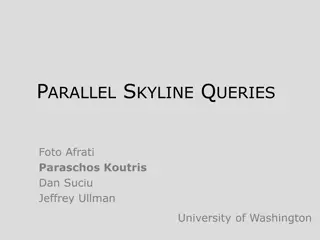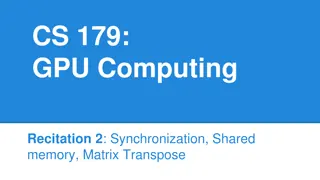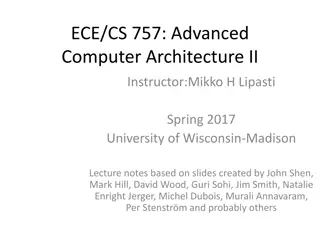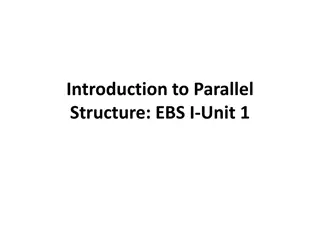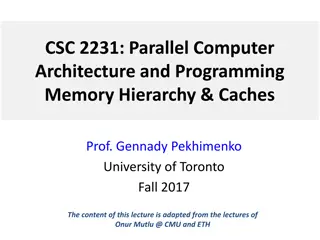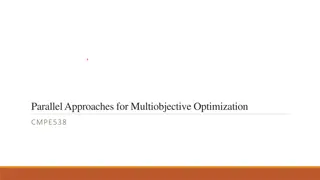Parallel Computing Examples in CHARM++
Explore examples of parallel computing in CHARM++ including finding the median of data spread out over a chare array, sending elements to correct positions in a sorted array, and sorting elements using different techniques. Follow discussions and ideas for median finding in chares arrays and learn through code snippets and top-level designs.
Download Presentation

Please find below an Image/Link to download the presentation.
The content on the website is provided AS IS for your information and personal use only. It may not be sold, licensed, or shared on other websites without obtaining consent from the author.If you encounter any issues during the download, it is possible that the publisher has removed the file from their server.
You are allowed to download the files provided on this website for personal or commercial use, subject to the condition that they are used lawfully. All files are the property of their respective owners.
The content on the website is provided AS IS for your information and personal use only. It may not be sold, licensed, or shared on other websites without obtaining consent from the author.
E N D
Presentation Transcript
CHARM++ EXAMPLES CHARM++ EXAMPLES 1
A few examples Some with code and some top level designs 1. How to find median of data spread out over a chare array 2. How to send a small number of wrong elements to their correct homes in an otherwise sorted array 3. How to sort elements in a chare array: 1. Using a parallel version of quick sort (may skip) 2. Using histogram sort Laxmikant Kal and PPL (UIUC) Parallel Migratable Objects 2
Discussion and Idea for median finding N chares in a chare array Each containing a set of numbers Median: a number X such that about half of all the numbers are smaller than it and half larger How to find the median? Idea: Main or chare0 makes a guess (how?) Broadcast to everyone Everyone counts smaller/larger Reduce to main Main updates the guess and repeats Chare 0 Chare 1 Chare 2 Chare 3 Chare 4 Chare 5 Chare N-1 Laxmikant Kal and PPL (UIUC) Parallel Migratable Objects 3
Median Example: median.ci entry void computeMedian(){ while(true){ mainmodule Median { readonlyCProxy_Main mainProxy; mainchare Main { entry Main(CkArgMsg* m); entry [reductiontarget] void informRoot(int counts[2]); entryvoid computeMedian(){ } serial{ partition_array.queryCounts(median); } when informRoot(int counts[]) serial { int nSmaller = counts[0]; int nLarger = counts[1]; double error = (double)abs(nSmaller-nLarger)/(nSmaller + nLarger); if(error < 0.01){ CkPrintf("\nMedian = %lf (in %d iterations)\n", median, iter); CkExit(); } if(nSmaller > nLarger) max_range = median; else min_range = median; median = (min_range+max_range)/2; iter++; } } } }; array [1D] Partition { entry Partition(); entryvoid queryCounts(double median); }; }; Laxmikant Kal and PPL (UIUC) Parallel Migratable Objects 4
Median Example: median.C I #include "Median.decl.h /*readonly*/ CProxy_Main mainProxy; /*readonly*/ int K; class Main: public CBase_Main { Main_SDAG_CODE private: CProxy_Partition partition_array; double median, min_range, max_range; int iter; public: Main(CkArgMsg* m) { iter = 0, min_range = 0.0, max_range = 1.0; K = atoi(m->argv[2]); median = atof(m->argv[3]); // initial guess provided on command line mainProxy = thisProxy; partition_array = CProxy_Partition::ckNew(atoi(m->argv[1])); mainProxy.computeMedian(); } }; Laxmikant Kal and PPL (UIUC) Parallel Migratable Objects 5
Median Example: median.C II class Partition: public CBase_Partition { public: double *numbers; void queryCounts(double median){ int counts[2]; counts[0] = counts[1] = 0; for(int i=0;i<K;i++){ if(numbers[i]<median) counts[0]++; // # smaller than median else counts[1]++; // # larger than median } contribute(2*sizeof(int), counts, CkReduction::sum_int, CkCallback(CkReductionTarget(Main, informRoot), mainProxy)); } Partition(int guess) { numbers = new double[K]; srand48(time(NULL)); for(int i=0;i<K;i++) numbers[i] = drand48(); } void queryCounts(double median){...} }; #include "Median.def.h" Laxmikant Kal and PPL (UIUC) Parallel Migratable Objects 6
Relaxing an assumption We assumed in the above code: The main chare knows the smallest and largest possible values Under what conditions is that valid or efficient? How can we relax that assumption? Discuss Laxmikant Kal and PPL (UIUC) Parallel Migratable Objects 7
Improving Our Median Program further How can we improve its efficiency? What are the costs? Discuss Number of rounds Cost of each round Laxmikant Kal and PPL (UIUC) Parallel Migratable Objects 8
Improving Our Median Program further How can we improve its efficiency? What are the costs? For each probe, the queryCounts method has to loop through the entire array What if we pre-sort the array? What if we partially sort the array (and keep improving it at every probe) How to improve the initial guess? So as to reduce the number of broadcast-reduction iterations How to get more information with each reduction? After all the cost of reduction doesn t change much if we reduce a small vector instead of just 2 counts Histogramming Laxmikant Kal and PPL (UIUC) Parallel Migratable Objects 9
A somewhat related problem Consider a situation in which a chare array is sorted Values are between 0 and M, long integers Without worrying too much about data balance The data distribution is uniform, so, we decide that chare I will hold values between (I*M/P, (I+1)*M/P -1) Where P is the number of chares in the array Now, each chare generates a few new items Their value may be anywhere in the range 0..M Let us assume the few is really small, like 5 or 10 And P is large (say > 10,000) Also, the total data on each chare is large.. But that s immaterial How can we send them to their correct home places? Laxmikant Kal and PPL (UIUC) Parallel Migratable Objects 10
Send a few stragglers home Easy enough: Just send a message for each new value to its home (it is easy to calculate home) Optimize: don t send message to yourself Optimize?: combine messages going to the same processor? Rare so we will ignore for now The problem? How do we know when we are done So, each chare can start the next phase of computation, for example Laxmikant Kal and PPL (UIUC) Parallel Migratable Objects 11
Quiescence Detection In Charm++, quiescence processor is executing any entry method, no messages are awaiting processing, and there are no messages in-flight Charm++ provides a method to detect quiescence: From any chare, invoke CkStartQD(callback); The system is always doing the background bookkeeping so it can detect quiescence The call just starts a low-overhead distributed algorithm to detect the condition It runs concurrently with your application So, call CkStartQD as late as possible to reduce the overhead quiescence is defined as the state in which no Laxmikant Kal and PPL (UIUC) Parallel Migratable Objects 12
Quiescence Detection applied to stragglers For our problem, we can have one of the chares (say with index 0) call CkStartQD after it has done its sending With a callback that broadcasts to every chare in the array that quiescence has been attained This means all the stragglers have reached their home Laxmikant Kal and PPL (UIUC) Parallel Migratable Objects 13
Histogram sort Idea: extend the median finding algorithm If we have P chares, we need to find P-1 separator keys I.e. values that act as (or define) boundaries between chares Such that everyone has an (approximately) equal number of values We can make a guess (called a probe) Collect a histogram (counts) Correct the guesses and prepeat When adequate separators are identified: Everyone sends the data to where it belongs Use quiescence detection to make sure all the data is received Sort locally Laxmikant Kal and PPL (UIUC) Parallel Migratable Objects 14
Histogram sort: interesting optimizations Some optimizations to this algorithm exploit charm++ s message driven execution E.g. Some chares separators may be found early on: Everyone can start sending their values in parallel with histogramming for other chares Histogramming and initial local sorting may be overlapped Histogram may be decomposed into multiple portions So that it can be pipelined While root is preparing the next guess for one ection, the other section is doing it distributed histogramming See paper by Vipul Harsh: https://charm.cs.illinois.edu/papers/19-02 Laxmikant Kal and PPL (UIUC) Parallel Migratable Objects 15


